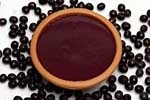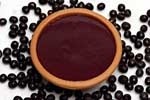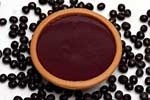Açai lowers cholesterol and attenuates atherosclerosis, rabbit study

The adult male New Zealand white rabbits were fed a cholesterol-enriched diet (0.5%) for 12 weeks and then randomized to receive açai (Euterpe Oleracea) extract or water plus a 0.05% cholesterol-enriched diet for another 12 weeks.
At the end of the study, published online ahead of print in the Journal of Atherosclerosis and Thrombosis and conducted at Department of Medicine at the Federal University of Para. PA, Brazil, researchers took blood samples and specimens of the aortas of the rabbits.
Those consuming the açai extract had lower serum levels of total cholesterol, non-HDL-cholesterol and triglycerides than controls, a smaller atherosclerotic plaque area in their aortas, and a smaller intima/media ratio than controls, without differences in plaque composition.
While campesterol, β-sitosterol, and desmosterol plasma levels did not differ between groups at the end of the study, rabbits fed the açai extract showed lower desmosterol/campesterol and desmosterol/ β-sitosterol ratios than controls.
Effects related in part to a better balance in the synthesis and absorption of sterols
The study showed that açai “markedly improved the lipid profile and attenuated atherosclerosis”, concluded the authors.
“These effects were related in part to a better balance in the synthesis and absorption of sterols.
“In addition to the previously reported possible antiatherosclerotic properties of Euterpe Oleracea mainly based on the high content of antioxidant compounds in their fruits, our study has shown that consumption of Euterpe Oleracea extract improved the balance between cholesterol absorption and synthesis, decreased serum cholesterol and triglcerides and attenuated atherosclerosis.”
They added: “The reduction of atherosclerosis probably results from the sum of multiple beneficial actions of Euterpe Oleracea including decreased ratios of markers of cholesterol synthesis and absorption, reduced oxidative modification of lipoproteins, increased expression of LDL receptors and improved endothelial function.”
Plasma phytosterols and desmosterol were tested using ultra-performance liquid chromatography and mass spectrometry. Atherosclerotic lesions were estimated by computerized planimetry and histomorphometry.
Schauss: Açai could be ‘potent early life intervention to mitigate this insidious degenerative disease’
Commenting independently on the study, acai expert Dr Alex Schauss from US-based contract research organization AIBMR Life Sciences, said the study added to the growing body of evidence suggesting the cardiovascular benefits of açai.
He added: “As you reported earlier this year on our study published in Atherosclerosis on the significant inhibition in the progression of atherosclerotic lesions in ApoE mice fed açai on a high fat diet, this new study out of Brazil confirms the benefit of açai fruit pulp in markedly improving the lipid profile and attenuating the development of atherosclerosis in male New Zealand rabbits.
“The implications of these findings if demonstrated in humans is significant given that atherosclerosis is the number one cause of premature mortality in humans. Our studies and others might suggest that açai could be a potent early life intervention to mitigate this insidious degenerative disease.”
With the appearance of a purple grape and taste of a tropical berry, Açai berries (pronounced ah-sigh-ee) have been shown to have powerful antioxidant properties thanks to a high level of anthocyanins, pigments that are also present in red wine.
Açaí pulp and juice has also been shown to possess several anti-inflammatory effects, including inhibition of nitric oxide production via a reduction in inducible nitric oxide synthase (iNOS) expression.
Source: Journal of Atherosclerosis and Thrombosis, 2011 Dec 3, published online ahead of print
“Euterpe Oleracea (Açai) Modifies Sterol Metabolism and Attenuates Experimentally-Induced Atherosclerosis.”\
Authors: Feio CA, Izar MC, Ihara SS, Kasmas SH, Martins CM, Feio MN, Maués LA, Borges NC, Moreno RA, Póvoa RM, Fonseca FA.
















